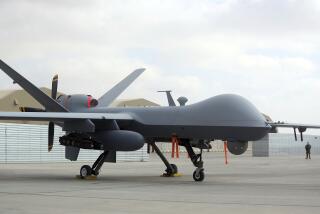Iraq Given Ultimatum on Missiles
- Share via
WASHINGTON — The United States and its major U.N. allies on Wednesday formally gave Baghdad 48 hours to remove its antiaircraft missiles from the “no-fly zone” in southern Iraq or face military action--including the destruction of some key Iraqi military facilities.
The nine-paragraph ultimatum, delivered in a brief meeting with Iraq’s U.N. ambassador, Nizar Hamdoon, was issued by the United States, Britain, France and Russia, the four permanent members of the Security Council who imposed the no-fly zone last Aug. 26.
Officials said the 48-hour deadline will expire about 2:15 p.m. Pacific time Friday. If Iraq has not removed the missiles by then, officials said, Western attack aircraft--principally from the United States--will take retaliatory action against the missiles and other Iraqi targets.
The bluntly worded document also ordered Iraq to halt all flights--fixed-wing and helicopter--below the 32nd Parallel, the northern boundary of the allied no-fly zone, and to avoid using its radar to track allied patrol aircraft.
“No threat to coalition (allied) operations will be tolerated,” the document said. It warned that if Baghdad chooses to flout the allied order, Western forces “will respond appropriately and decisively.”
Pentagon authorities declined to say precisely what kinds of facilities the Western aircraft would strike. But American and allied officials said that planners already have picked out a range of possible targets, from air bases to communications centers.
They said the scope and intensity of the Western attacks will depend largely on how Iraqi President Saddam Hussein responds to Wednesday’s ultimatum. If Hussein flouts the allied demand, the degree of damage could be substantial.
But at the same time, officials sought to dampen fears that the allied use of force might spark a military confrontation with Iraq. “It will be one night of attention-getting,” a Pentagon official said. Some military officials reportedly oppose the action.
In Little Rock, Ark., President-elect Bill Clinton said his foreign policy transition team has been in close touch with the Bush Administration on the Iraqi situation and that he supports the Administration’s stand.
Bush Administration officials portrayed the new, more tough-minded Western stance as necessary to prevent Hussein from “testing” the West’s resolve more forcefully between now and the start of the Clinton Administration on Jan. 20.
But there were indications that key Bush Administration policy-makers are split, both over the seriousness of the latest Iraqi provocations and over the need to retaliate now.
Knowledgeable officials said the White House is pushing especially hard for new action, in part to punish Hussein for earlier defiance, particularly last May, when he temporarily blocked a U.N. weapons inspection team from entering his Agriculture Ministry building.
But they said that military leaders--particularly Gen. Colin L. Powell, chairman of the Joint Chiefs of Staff--are less worried than the Administration about the implications of the Iraqi actions, and far less enthusiastic about retaliating now.
A source close to Powell said Wednesday that the general does not want to become involved in the Persian Gulf now and “does not think (that the latest Iraqi provocations are) a very big deal.”
Times staff writers Robin Wright, Doyle McManus, Norman Kempster and Jim Mann contributed to this report.
More to Read
Sign up for Essential California
The most important California stories and recommendations in your inbox every morning.
You may occasionally receive promotional content from the Los Angeles Times.













